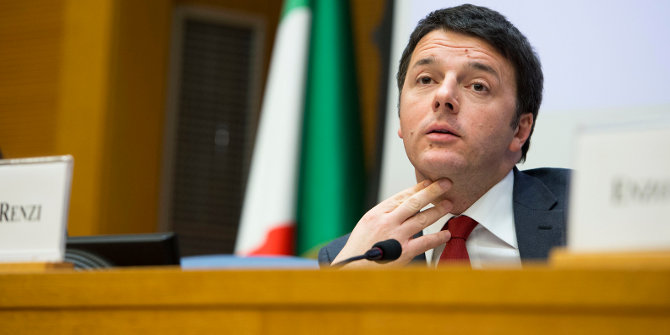 The Swiss government is composed of a seven-member Federal Council, which is usually appointed after a parliamentary election. However, on 20 September, a new member of the Federal Council will be appointed due to the resignation of Swiss foreign minister Didier Burkhalter in June. Sean Mueller gives an overview of the three main candidates vying for the position.
The Swiss government is composed of a seven-member Federal Council, which is usually appointed after a parliamentary election. However, on 20 September, a new member of the Federal Council will be appointed due to the resignation of Swiss foreign minister Didier Burkhalter in June. Sean Mueller gives an overview of the three main candidates vying for the position.

Federal Palace in Bern, Credit: Josar Photos (CC BY-NC-ND 2.0)
On 20 September, the Swiss Parliament will elect one new member of government. One out of seven, with all seven enjoying equal powers. With three left-of-centre and three right-of-centre ministers waiting, this new appointment could tip the balance in one direction or the other – at a time when Switzerland’s relations with the EU are almost as insecure as those of the UK. So, the stakes are high.
But despite the high stakes, the election promises limited drama. Why so? Switzerland’s system of government favours compromise over competition, power sharing over power play, and proportionality over plurality. Government elections are no exception: the two parliamentary chambers share power by holding a joint session to elect all government members individually. This normally happens in four year-intervals, right after the parliamentary elections (the last time in December 2015).
However, because the acting foreign minister has resigned earlier than expected, an extraordinary election to replace him is necessary. To be elected, a majority of valid MP votes is required – since no party alone has those numbers, electoral coalitions are needed. And what better way to ensure a smooth election than sharing the seven seats among the four main parties that together occupy 86% of all parliamentary seats?
The Minister to be replaced now is from the Liberal Party and no other party – not even from the opposition – has denied their claim to retain it. The same Liberal Party, by the way, which has been part of the national executive without interruption since 1848. So, that is where the drama dies. However, the real source of excitement stems from the fact that parliament has a choice between the party’s three official candidates (although anybody with the right to vote can be elected, it is customary to honour the party’s preselection). On this occasion, there are three distinct choices, dubbed the tinker (Isabelle Moret), the tailor (Pierre Maudet), and the soldier (Ignazio Cassis).
The tinker: Isabelle Moret
A tinker is “a person who makes a living by travelling from place to place mending pans and other metal utensils” or, informally, a “mischievous child”. That characterisation best fits Isabelle Moret, aged 46, National MP since 2006. She is the only woman on the official ticket – for a party that prides itself on being culturally progressive but which has not had a female minister since the Cold War.
She is from Canton of Vaud – but that canton already has a serving minister and territorial over-representation is jealously reacted to by the other parts of Switzerland. She is well-travelled in a linguistic sense, too: next to French she also speaks Italian and even Swiss-German. Finally, her nickname from her early days as a politician was “Fée Clochette” – or, in English: “Tinker Bell”.
The tailor: Pierre Maudet
Next up is the tailor, “a person whose occupation is making fitted clothes such as suits, trousers, and jackets to fit individual customers.” Metaphorically, that perfectly summarises the career of Pierre Maudet, aged 39, Government Minister of the Canton of Geneva since 2012. He has made a name of himself by striking deals with both the left and the state prosecutor, has built prisons, enforced zero tolerance on crime, but has also given illegal residents the option to stay (Operation Papyrus). He is also a French and Swiss double citizen. Needless to say, he is always perfectly dressed.
The soldier: Ignazio Cassis
Finally, the soldier is “a person who serves in an army.” Although in Switzerland all men have to serve in the army, some serve more and also lead. Ignazio Cassis, aged 56, occupies the rank of a major. He is also the leader of the Liberal party’s parliamentary group. He is from Ticino, so his mother tongue is Italian, and he too is a double citizen, of Italy and Switzerland – or rather was, until a few weeks ago, when he gave up his Italian citizenship.
Loyalty to his potential new post would demand it, he said. A national MP since 2007, his claim might seem the strongest: power sharing includes juggling the seven seats among the four national language groups, and the Italian-speakers have not had a representative since 1999. However, a medical doctor by training, he is also the president of Curafutura, a lobby group on behalf of four major health insurers. So many wonder: whose soldier is he now and will he be?
Though the election will take place on 20 September, the winner won’t take up their position until 1 November. On Wednesday, then, parliament will decide which path to follow – and whether tinker, tailor, or soldier will take their place on the Federal Council.
Please read our comments policy before commenting.
Note: This article gives the views of the author, not the position of EUROPP – European Politics and Policy or the London School of Economics.
_________________________________
 Sean Mueller – University of Berne
Sean Mueller – University of Berne
Sean Mueller is a Lecturer and Postdoctoral Researcher at the Institute of Political Science, University of Berne. He currently directs a Swiss National Science Foundation project on territorial lobbying and is co-convenor of the working group on “Federalism & Territorial Politics” of the Swiss Political Science Association.




